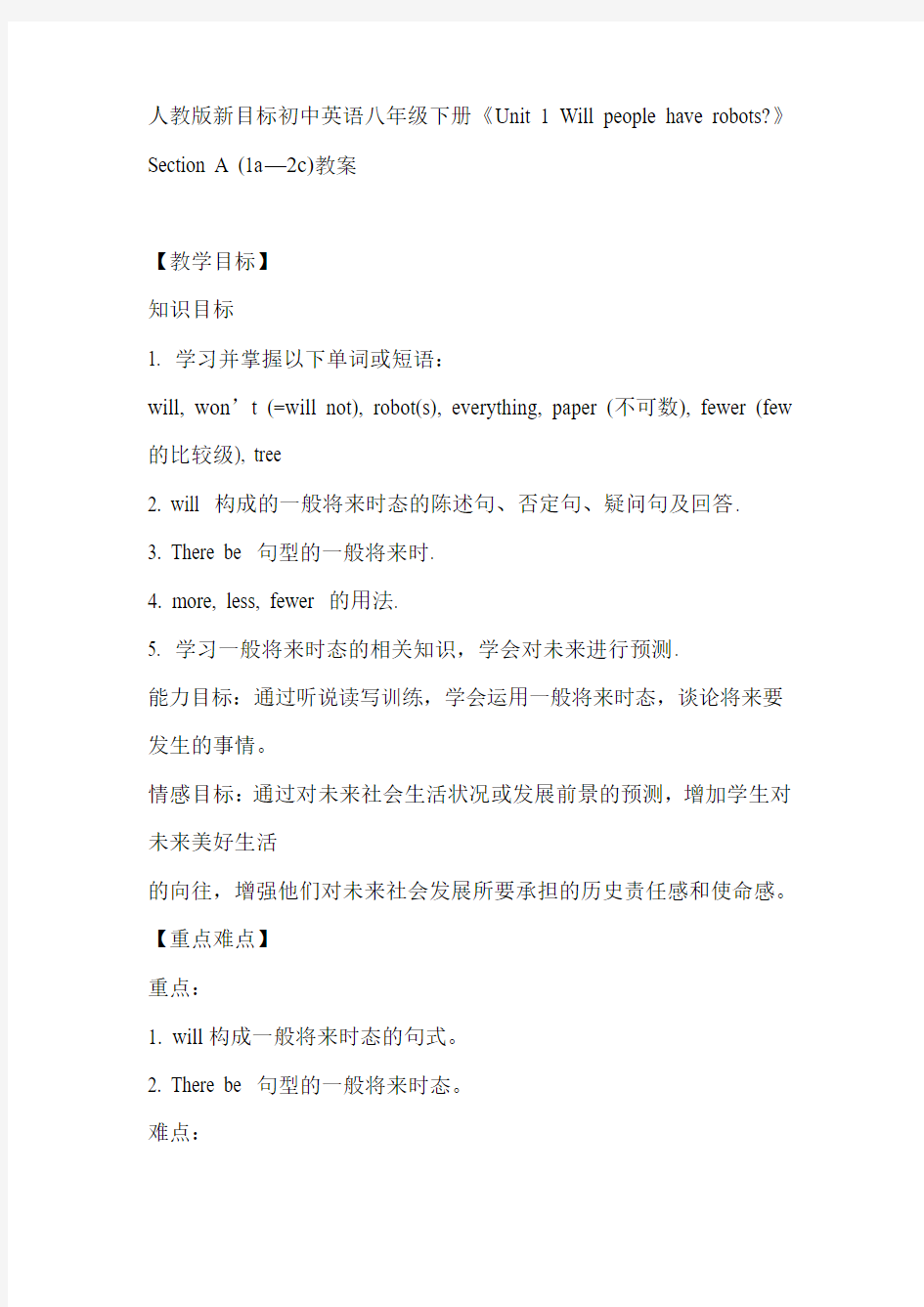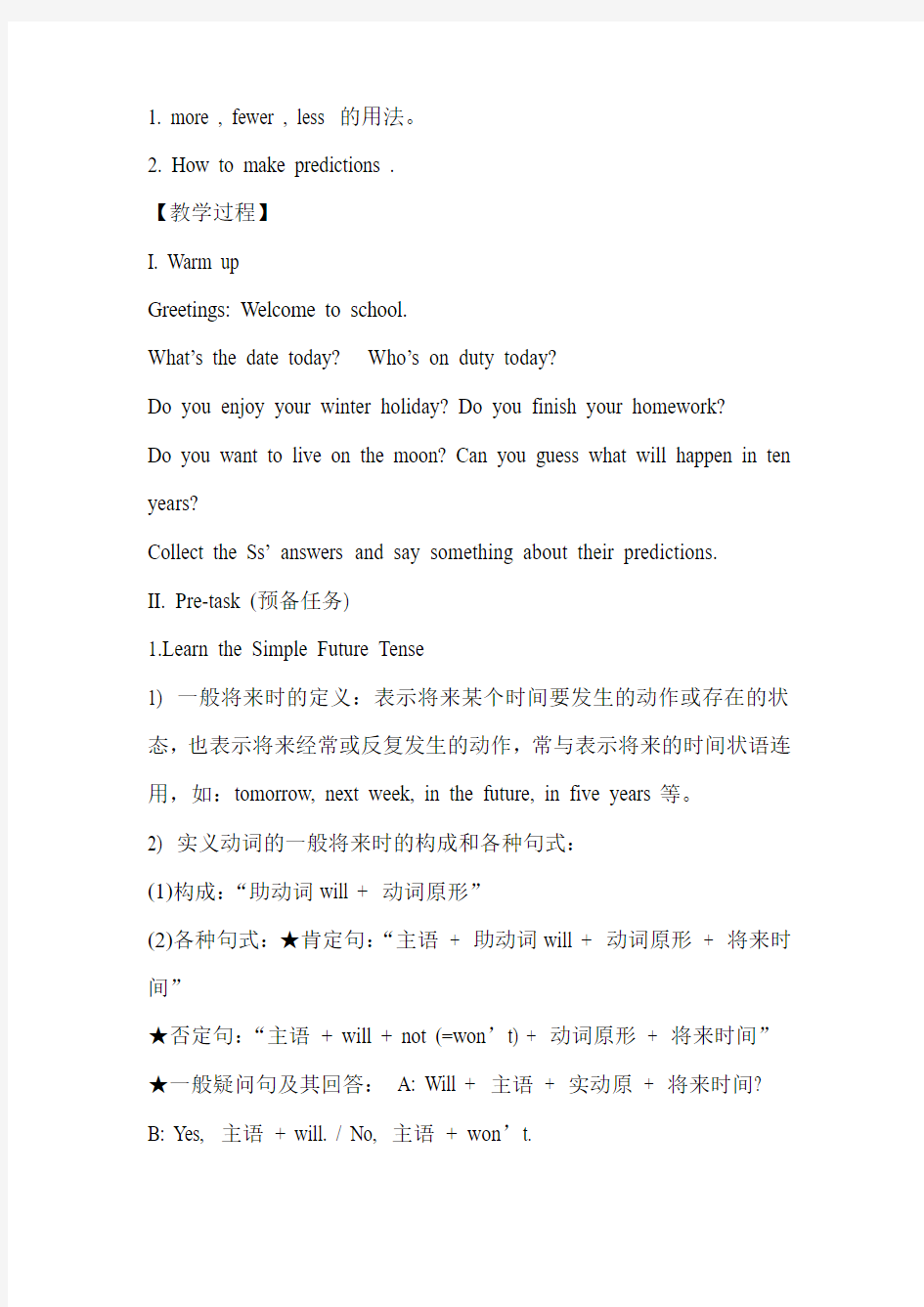

人教版新目标初中英语八年级下册《Unit 1 Will people have robots?》Section A (1a—2c)教案
【教学目标】
知识目标
1. 学习并掌握以下单词或短语:
will, won’t (=will not), robot(s), everything, paper (不可数), fewer (few 的比较级), tree
2. will 构成的一般将来时态的陈述句、否定句、疑问句及回答.
3. There be 句型的一般将来时.
4. more, less, fewer 的用法.
5. 学习一般将来时态的相关知识,学会对未来进行预测.
能力目标:通过听说读写训练,学会运用一般将来时态,谈论将来要发生的事情。
情感目标:通过对未来社会生活状况或发展前景的预测,增加学生对未来美好生活
的向往,增强他们对未来社会发展所要承担的历史责任感和使命感。【重点难点】
重点:
1. will构成一般将来时态的句式。
2. There be 句型的一般将来时态。
难点:
1. more , fewer , less 的用法。
2. How to make predictions .
【教学过程】
I. Warm up
Greetings: Welcome to school.
What’s the date today? Who’s on duty today?
Do you enjoy your winter holiday? Do you finish your homework?
Do you want to live on the moon? Can you guess what will happen in ten years?
Collect the Ss’ answers and say something about their predictions.
II. Pre-task (预备任务)
1.Learn the Simple Future Tense
1) 一般将来时的定义:表示将来某个时间要发生的动作或存在的状态,也表示将来经常或反复发生的动作,常与表示将来的时间状语连用,如:tomorrow, next week, in the future, in five years等。
2) 实义动词的一般将来时的构成和各种句式:
(1)构成:“助动词will + 动词原形”
(2)各种句式:★肯定句:“主语+ 助动词will + 动词原形+ 将来时间”
★否定句:“主语+ will + not (=won’t) + 动词原形+ 将来时间”★一般疑问句及其回答:A: Will + 主语+ 实动原+ 将来时间? B: Yes, 主语+ will. / No, 主语+ won’t.
★特殊疑问句及其回答:A: 疑问词+ will + 主语+ 实动原形+ 将来时间?
B: 主语+ will + 动词原形+ 将来时间
3) There be结构的一般将来时的构成和各种句式:
(1)构成:“There + will + be + 主语+ ….”
(2)各种句式:★肯定句:“There + will + be + 主语+ 将来时间”★否定句:“There + will + not (=won’t) + be + 主语+ 将来时间”★一般疑问句及其回答:A: Will there + be + 主语+ 将来时间? B: Yes, there will. / No, there won’t.
★特殊疑问句及其回答:A: How many + 名词复数+ will there +…? B: There will + be + 主语(名词)+….
4)Notes:
1) will在名词或代词后常缩略为’ll,will not 常缩略为won’t
2) “现在进行时”和“be going to + 动词原形”也可表示将要发生的动作。可以同义句转换。
(1) I am going shopping tomorrow. = I will go shopping tomorrow.
(2) She is going to have a party next weekend.=She will have a party next weekend.
2. Learn the new words:
1) robot (s) n. 机器人如:I think people will have robots in their home in the future.
I saw a robot on TV yesterday and it cleaned the kitchen
He won first prize in the 5th international robot competition.
2) everything pron. 每件事情
Everything goes well. Everything will be free in 100 years.
3) paper n. 纸张不可数名词,没有复数,它的数量用“数字+ piece(s) of …”表示。
Books will be on computers and won’t be on paper. Write the new words on a piece of paper.
There are 50 pieces of paper in the notebook.
4) few 和little 的用法比较
(1)few adj. (很少/原级)→fewer (更少的/比较级)→fewest (最少的/最高级), 后跟可数名复。
She is new here, so she has few friends. (原级) I have fewer tomatoes than she does. (比较级)
Tom has the fewest toys of all the students. (最高级)
(2) little adj. (很少/原级)→less (更少的/比较级)→least (最少的/最高级),后跟不可数名词。
She is poor here, so she has little money. (原级) I have less money than she does. (比较级)
Tom has the least money of all the students. (最高级)
5) many / much adj. (很多/原级) →more (更多的/比较级) →most (最多的/最高级),
其中many后跟可数名词复数,much后跟不可数名词。试比较:
(1)He has much time to relax. Dave has more time than him. Kate has the most time of them.
(2) You have many cars. We have more cars than you. They have the most cars of all.
6) pollute v. 弄脏;污染→pollution n. (不可数)
Don’t pollute your clothes! There will be less pollution in the future. 7) tree (s) n. 树
There will be fewer trees and cities will be really big and crowed.
There are lots of apples on the tree. (用介词on——自身/ 苹果是树上生长出来的)
There are a few birds in the tree. (用介词in——外来/ 小鸟是飞到树上的)
III. While-task (同步任务)
Task1: 1a
1) Read these predictions in the future and then check A for agree or B for disagree.
2) Listen and circle the predictions you hear in 1a. Answers: 1, 2, 4, 5 Task2: 1b
1) Practise reading the six predictions .
2) Read the instructions to Ss .Circle the things you hear on the recording .
3) Play the tape twice .
4) Play the tape a third time .At the same time ,check the answers .
Task3: 1c
1) Pay attention to the dialogues .2) Read the dialogues fluently .
3) Pairwork .Work in pairs to make predictions according to the sample .
4) Ask several pairs to share their conversations to the class .
Task4: 2a & 2b .
1) Read the predictions . 2) Read the instructions and point out the sample answer .
3) Play the tape twice .Ss circle the word they hear in each sentence: more , less , fewer .
4) Check the answers .
IV. Post-task (任务提升)
1.Look at 2b. Make conversations about the predictions and let Ss act them out in pairs.
A: I think there will be more pollution.
B: Well, I don’t agree. But I think there will be fewer trees.
A: I agree.
2. Let Ss talk about what they will do next weekend or what will happen in 100 years
using the Simple Future Tense. For example: I will do homework on Saturday morning.
Then I will go shopping with my mom. I will ….
V. Summary
1.Review the grammar box .Ss say the statements and responses .
2.Make summaries about “will” ,“fewer” and “less” .
VI. Homework
1.巩固本节课所学单词及语法知识。
2.做《学案》《同步》《配套》上第1课时题目。
3.预习第2课时单词。
【教后反思】